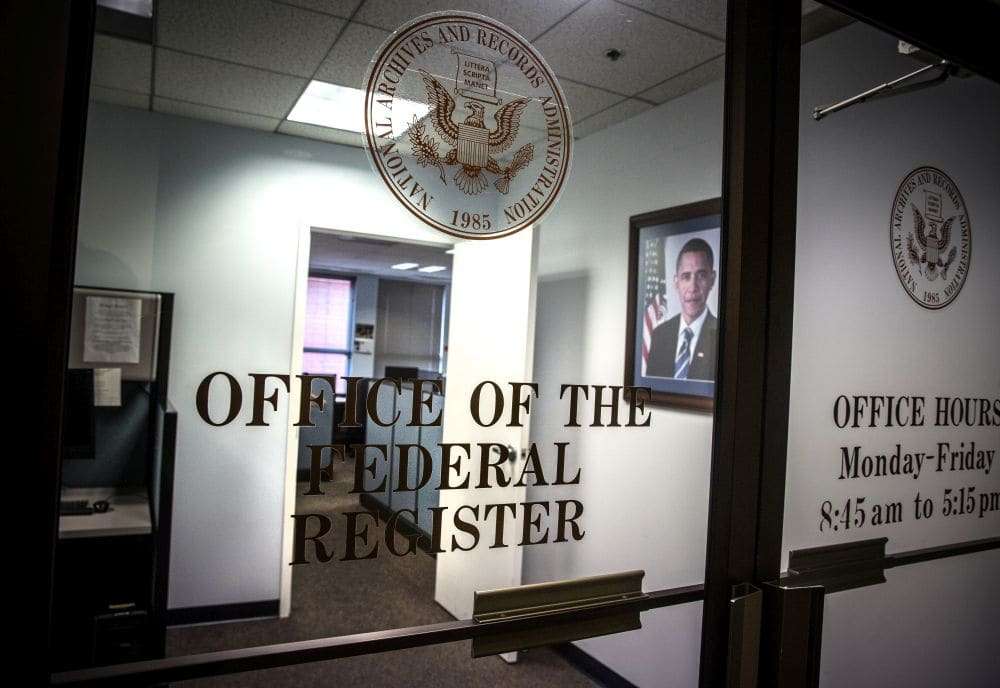The Volokh Conspiracy
Mostly law professors | Sometimes contrarian | Often libertarian | Always independent
Can you hold copyright in federal law?

The U.S. District Court for the District of Columbia decided last week (Am. Soc. for Testing Materials v. Public.Resource.org) that standards-setting organizations whose work product is "incorporated by reference" into federal law do not lose copyright protection for their works (and can, therefore, prohibit others from copying or distributing their standards, or charge for access to them).
Standards, the court observed, "are typically developed by standards developing organizations ("SDOs"), like Plaintiffs, who work to develop 'voluntary consensus standards,'" such as the ones at issue in the case. One of the plaintiffs (ASTM), for instance, has "developed over 12,000 standards that are used in a wide range of fields, including consumer products, iron and steel products, rubber, paints, plastics, textiles, medical services and devices, electronics, construction, energy, water, and petroleum products, and are the combined efforts of over 23,000 technical members, representing producers, users, consumers, government, and academia."
Pursuant to 5 U.S.C. § 552, federal agencies may incorporate such voluntary consensus standards - as well as, for example, state regulations, government-authored documents, and product service manuals - into federal regulations by reference. Applicable regulations provide that a "publication is eligible for incorporation by reference" if it is "published data, criteria, standards, specifications, techniques, illustrations, or similar material," and it must be "reasonably available to the class of persons affected thereby" before it can be deemed to have been incorporated into the law.
Plaintiff ASTM sells PDF and hard-copy versions of its standards, including those that have been incorporated by reference into law, at prices ranging from $25 to $200.
This case involves 257 of ASTM plaintiffs' standards that have been incorporated by reference into federal law. Defendant Public Resource, a not-for-profit entity devoted to publicly disseminating legal information so as to "make the law and other government materials more widely available so that people, businesses, and organizations can easily read and discuss [the] laws and the operations of government," purchased hard copies of each of the standards at issue, scanned them into PDF files, added a cover sheet, and posted them online at the Public Resource website (as well as at the Internet Archive).
ASTM alleged that this constituted copyright infringement, and the court agreed.
At the heart of Defendant's defense is the argument that Plaintiffs' standards lost their copyright protections the instant they were incorporated by reference into federal regulations. There are weighty policy arguments on both sides of this issue, including the need to preserve a vital and complicated public-private partnership between the government and SDOs, and the need for an informed citizenry to have a full understanding of how to comply with the nation's legal requirements.
Copyright protection, the court noted, "is a creature of statute," and in its view "Congress has already passed on the question of revoking copyright protection for standards that have been incorporated by reference into regulations." While Section 105 of the Copyright Act provides that "copyright protection under this title is not available for any work of the United States Government," the statute defines a "work of the United States Government" as "a work prepared by an officer or employee of the United States Government as part of that person's official duties," a definition that does not include the SDO-developed standards at issue here. Congress has considered broadening the definition to include these works in the past, but rejected all such attempts.
Congress already carefully weighed the competing policy goals of making incorporated works publicly available while also preserving the incentives and protections granted by copyright, and it weighed in favor of preserving the copyright system. … This conclusion does not dismiss or diminish the valid public policy concern that citizens benefit from greater access to statutes, regulations, and all materials they must reference in fulfilling their legal obligations. The ability to know, understand, and communicate the law as a broad concept is of paramount importance to the continued success of our democracy. However, changes to the statutory or regulatory framework that reconsider the balancing of interests underlying modern copyright law and incorporation by reference must be made by Congress, not this court.
Unfortunately, I think Judge Chutkan got the copyright analysis correct on this one; there is simply no provision in the Copyright Act that can be read to strip protection for works that become, after their creation, incorporated into the law.
It is a very unfortunate state of affairs. Almost 10 years ago, in response to a similar copyright claim (by the state of Oregon, no less) asserting copyright in the text of its laws, I wrote that "it is completely outrageous that in 2008 [!!] we do not have a complete and authoritative compendium of all of the laws of the 50 States, and the federal government, available at no cost on the Internet." It was true then, and it is true now; the idea that one has to purchase a copy of relevant regulatory requirements that you are required, by law, to comply with is outrageous - and the fact that one can consult a hard copy of the regulations at the Office of the Federal Register in Washington does not make it less so.
But I have to say that Chutkan is probably correct that this is something that Congress, and not the courts, should deal with.


Show Comments (0)